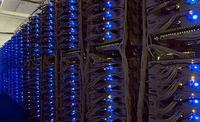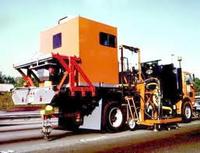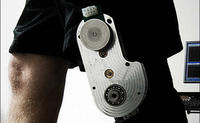-
Cutting massive power use at big data companies in a flash

Big data needs big power; the server farms that undergird the Internet run on a vast tide of electricity — Google, for example, uses enough electricity in its data centers to power about 200,000 homes; now, a team of engineers has a solution that could radically cut that power use — a new type of memory in companies’ servers that demands far less energy than the current systems
-
-
New rapid diagnostic test for pathogens, contaminants developed
Using nanoscale materials, researchers have developed a single-step method rapidly and accurately to detect viruses, bacteria, and chemical contaminants; the method could be used to detect pathogens and contaminants in biological mixtures such as food, blood, saliva, and urine
-
-
Unmanned systems emulate animals’ conditioned fear-response mechanism for self-preservation
When animals in the wild engage in eating or grazing, their eyes, ears, and sense of smell continuously monitor the environment for any sense of danger; researchers developed a similar conditioned fear-response mechanism for unmanned systems
-
-
Using cold plasma to fight fires
Traditional fire-suppression technologies focus largely on disrupting the chemical reactions involved in combustion; from a physics perspective, however, flames are cold plasmas; DARPA, the Pentagon’s research arm, theorized that by using physics techniques rather than combustion chemistry, it might be possible to manipulate and extinguish flames
-
-
New international plan to tackle cyber crime, make Internet safer
A new international plan to tackle cyber crime has been launched; the new research roadmap has been developed by leading international cyber security researchers along with industry and government experts, and it aims to help make the Internet of tomorrow a safe and secure platform which is vital for global economic growth and societal development
-
-
New sensors detect contaminants in water
Many organic contaminants in the air and in drinking water need to be detected at very low-level concentrations; researchers have investigated the use of graphene oxide films in which the semiconductor titanium dioxide (TiO2) and metal nanoparticles are deposited on opposite sides of the graphene surface
-
-
Clay-based coating holds promise of green flame retardants
The thick, fast-forming coating has a uniformly high concentration of flame-inhibiting clay particles, and it adheres strongly to the Swiss cheese-like surface of polyurethane foam, which is used in furniture cushions, carpet padding, children’s car seats, and other items
-
-
Loo turns poo into power
Researchers have invented a new toilet system that will turn human waste into electricity and fertilizers and also reduce the amount of water needed for flushing by up to 90 percent compared to current toilet systems
-
-
Forensic research using DNA sequencing technology
The Ion Personal Genome Machine (PGM) Sequencer translates chemical sequencing information directly into digital form by using semiconductor technology; it enables the analysis of ninety-six samples in one run, allowing forensic practitioners to obtain more information from the samples they process; the sequencer is suitable for a wide array of forensic identification applications, including missing persons identifications, mass disaster work, interpretations of complex mixtures, and bio-defense
-
-
Paper-printed rapid disease detection test
Complex laboratory investigations do produce reliable results, but they are not useful for point-of-care diagnostics; researchers have come up with a clever idea: biosensors based on paper; the test is printed on one side of a chromatography paper, the paper is folded up origami-style, laminated, and the test is ready; test evaluation requires only a voltmeter
-
-
Do nano-pesticides hold promise or pose threat to greener agriculture?
Nanotechnology has developed significantly in the past decade and was able to create many new materials with a vast range of potential applications; the risk that nano-particles may pose to human and environment health, however, is not yet fully understood; a precautionary principle suggests keeping environmental release of nano-particles minimal until their fate and toxicity is better understood
-
-
3-in-1 water monitoring system
All water treatment plants using membrane technology are required to be able to perform three processes to comply with international standards: identify whether there are any bacteria or contaminants; detect any broken membrane filters in the treatment plant; and pinpoint which filter is broken — accurate to 1 in 100,000 filters; a new, innovative device performs all three processes
-
-
Automated pavement crack detection and sealing system to extend roadways life

Researchers from the Georgia Tech Research Institute developed a prototype automated pavement crack detection and sealing system; in road tests, the system was able to detect cracks smaller than one-eighth-inch wide and efficiently fill cracks from a vehicle moving at a speed of three miles per hour
-
-
New method uses gunshot residue to determine caliber, type of weapon used in crime
Researchers have developed a method to determine the caliber and type of weapon used in a crime by analyzing gunshot residue (GSR); using near-infrared (NIR) Raman microspectroscopy and advanced statistics, the new technique may play a pivotal role in law enforcement cases and forensic investigations
-
-
Knee-strapped power harvester to do away with batteries

Battery-powered devices may soon be a thing of the past; researchers have created an innovative energy harvester to power some of the latest wearable gadgets; the energy harvester, strapped to the knee joint, converts knee motions into energy
-
More headlines
The long view
Risk Assessment with Machine Learning
Researchers utilize geological survey data and machine learning algorithms for accurately predicting liquefaction risk in earthquake-prone areas.
Bookshelf: Smartphones Shape War in Hyperconnected World
The smartphone is helping to shape the conduct and representation of contemporary war. A new book argues that as an operative device, the smartphone is now “being used as a central weapon of war.”
New Approach Detects Adversarial Attacks in Multimodal AI Systems
New vulnerabilities have emerged with the rapid advancement and adoption of multimodal foundational AI models, significantly expanding the potential for cybersecurity attacks. Topological signatures key to revealing attacks, identifying origins of threats.
